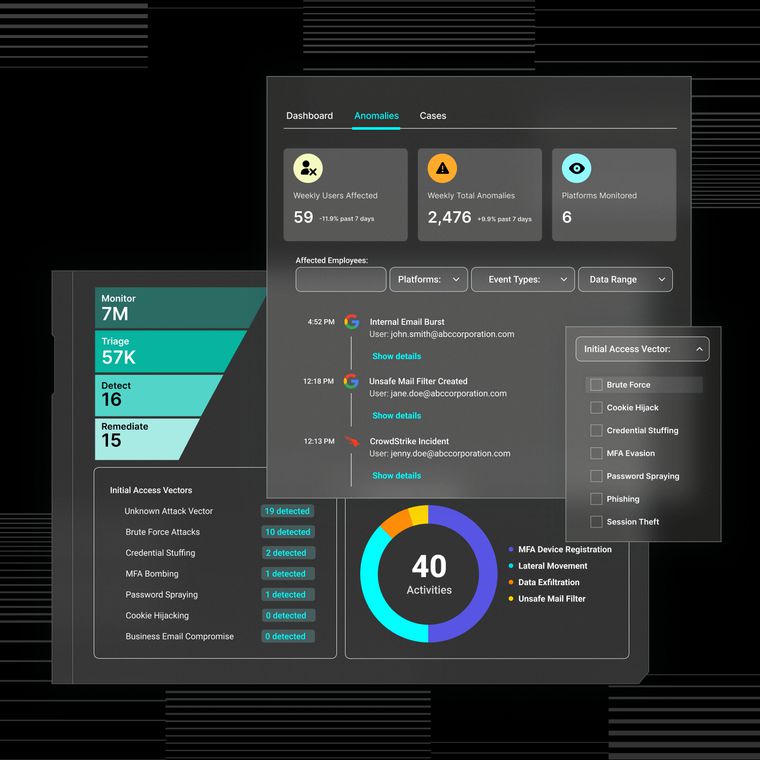Email Security for Hospitality: 7 Ways to Use AI to Protect Your Business
Find out how AI email security for hospitality prevents phishing and secures guest information.
August 15, 2025
The hospitality industry faces an unprecedented cybersecurity crisis. With the hotel segment projected to reach $511.91 billion by 2029, cybercriminals are increasingly targeting hotels, restaurants, and travel services that handle millions of travelers' sensitive data daily. The financial toll is escalating as data breach costs in hospitality jumped from $3.62 million to $3.86 million in just one year.
Recent incidents underscore the risk, such as the MGM Resorts attack that caused approximately $100 million in losses after help desk staff were deceived through social engineering. Another example is the one where hospitality workers received fake Booking.com emails that used deceptive CAPTCHAs to install credential-stealing malware.
AI-driven email security offers a strong defense against such incidents by detecting advanced phishing, stopping business email compromise, and countering social engineering tactics that exploit the hospitality industry’s complex vendor networks and transient workforce. This article explores seven AI-powered strategies to strengthen email security and protect your hospitality business from evolving cyber threats.
Why Email Security Matters in Hospitality
Email security matters in hospitality because organizations face critical email-driven threats that can devastate operations within hours. Data breaches steal passport scans, loyalty points, and cardholder data, which are prime commodities on dark-web markets. Meanwhile, ransomware encrypts property management systems and door-lock controls, forcing manual check-ins and creating substantial lost revenue.
Beyond operational disruption, business email compromise attacks divert vendor payments or guest deposits to attacker accounts, often remaining undetected until quarterly reconciliations. Similarly, brand erosion occurs when guests receive spoofed confirmation emails from your domain and subsequently blame your organization for fraud attempts.
Each breach inevitably triggers GDPR or PCI DSS regulatory scrutiny, plus potential chargebacks and litigation. What's more concerning is that attackers have industrialized hospitality targeting. Coordinated crews now use stolen credentials to leapfrog across multi-property groups, maximizing damage per attack.
The interconnected nature of hospitality operations further amplifies these email security risks. Since guest management systems, reservation platforms, and payment processing all depend on email communications that attackers systematically target, compromised systems create cascading impacts across entire property portfolios. Ultimately, protecting email infrastructure protects room revenue, maintains guest trust, and prevents regulatory enforcement actions.
What Makes Hospitality a Target
Hospitality presents concentrated attack opportunities that cybercriminals actively exploit through sophisticated email campaigns. The combination of high-value guest data, fast-moving operational workflows, and decentralized technology infrastructure creates optimal conditions for successful attacks.
High-Value Data and Financial Opportunities
Guest management systems store vast collections of payment cards, passport scans, and detailed stay histories that command premium prices on underground markets. Reservation and loyalty systems process enormous volumes of personal information, making hospitality inboxes prime targets for accessing valuable guest records.
Operational Pressures and Communication Patterns
Front-desk teams, sales managers, and finance staff exchange hundreds of time-sensitive emails daily with guests, online travel agencies, and vendors.
The hospitality service culture encourages immediate responses, providing social engineers with the urgency they need to push through fraudulent payment changes or credential-harvesting attempts.
Seasonal hiring patterns further favor attackers. Temporary workers often miss comprehensive security training during peak travel periods, creating vulnerabilities that coincide with the highest attack volumes.
Technology Infrastructure Vulnerabilities
Franchise structures, third-party property management systems, and countless endpoints create complex, sprawling environments with inconsistent security policies. Once a single mailbox is compromised, lateral movement across properties becomes straightforward, and operational downtime ripples quickly through booking, check-in, and payment systems.
High staff turnover creates persistent training gaps, while multi-tenant technology stacks suffer from uneven security patching across properties, leaving known vulnerabilities exposed for extended periods.
Why Traditional Defenses Fall Short
Legacy email security creates dangerous gaps in hospitality environments because these systems rely on static signatures and broad rules that cannot adapt to the industry's unique workflows and constantly evolving attack methods.
Missing Contextual Analysis
Signature-based filters fail when spoofed vendors send "updated bank details" requests with no malware payloads and SPF-passing domains. These clean-infrastructure attacks allow business email compromise to succeed despite being a leading breach vector in hospitality operations.
Traditional systems cannot analyze the subtle contextual cues that indicate fraudulent intent, such as unusual timing, relationship anomalies, or content that deviates from established vendor communication patterns.
Seasonal Vulnerability Exploitation
Cybercriminals deliberately launch campaigns during high-occupancy periods when temporary employees handle guest communications. Peak season volumes of fraudulent booking messages merge with authentic correspondence, saturating traditional security filters that struggle to differentiate legitimate context from malicious content.
Additionally, busy travel periods provide ideal environments for social engineering because staff prioritize rapid response times over comprehensive message verification protocols.
Vendor Ecosystem Complexity
Property management systems, point-of-sale providers, and contractors create sprawling networks of daily invoice communications. Basic gateways cannot detect when compromised suppliers subtly change file-sharing platforms, modify writing styles, or introduce new banking details within ongoing conversation threads.
The volume and variety of legitimate vendor communications make detecting threats nearly impossible for traditional filters to establish effective baseline patterns for comparison against potentially malicious messages.
Inconsistent Security Standards
Franchise business models create dramatically different security implementations across properties. Some locations enforce DMARC authentication while sister properties operate without basic email security protocols.
Attackers systematically target the weakest security implementations in property chains, exploiting inconsistencies that traditional gateways cannot reconcile across distributed environments.
This security fragmentation allows attackers to establish footholds in poorly protected properties, then pivot to target higher-value locations within the same brand ecosystem.
7 Ways to Use AI to Protect Your Hospitality Business
AI closes critical gaps in hospitality email defenses by learning how staff, vendors, and guests typically communicate, then automatically blocking anything that falls outside established patterns. These seven capabilities address high-risk hospitality workflows while reducing fraud, protecting guest data, and maintaining operations during peak seasons.
1. Implement Behavioral Anomaly Detection for Advanced Phishing and BEC
The foundation of AI-powered email security starts with behavioral anomaly detection, which creates comprehensive profiles of sender identity, communication styles, timing patterns, and financial transaction characteristics. When vendors suddenly request new wire transfer details or managers send emails at unusual hours from unknown devices, the system automatically quarantines messages before staff can respond. This approach excels in hospitality environments where frequent payment updates create numerous business email compromise opportunities.
2. Deploy AI-Powered Vendor and Supply Chain Trust Assessment
Building on behavioral analysis, AI continuously evaluates third-party senders using domain history, behavioral patterns, and global threat intelligence. When trusted suppliers experience account compromise and send invoices with modified routing numbers, alerts prevent emails from reaching accounts payable.
This proves essential because hotels manage property management providers, food vendors, contractors, and marketing agencies, each representing potential attack bridges.
3. Utilize Adaptive, ML-Based Email Filtering and Content Analysis
Beyond sender assessment, adaptive filtering analyzes message headers, language patterns, embedded URLs, and attachments in real time, learning operational distinctions between legitimate and malicious communications.
Legitimate confirmations from online travel agencies process normally, while suspicious booking links are routed to secure sandboxes that safely detonate potential malware. The same intelligence screens résumé attachments and loyalty program communications.
4. Implement AI-Assisted Authentication and Access Control
To complement email filtering, AI correlates suspicious emails with risky sign-in patterns and geographic anomalies to enforce step-up authentication only when genuinely necessary. This protects loyalty portals, shared property mailboxes, and finance dashboards storing sensitive guest data.
Staff avoid constant authentication prompts while remaining protected from account takeover attempts using reverse-proxy toolkits.
5. Deploy AI-Enhanced SIEM Correlation and Automated Response
Taking protection further, SIEM platforms ingest signals from email security alongside identity, endpoint, and network telemetry, using machine learning to identify attack patterns within seconds.
When staff click spoofed links and attackers pivot toward cardholder data access, the system automatically disables accounts, quarantines similar emails across the property chain, and generates incident tickets without human analysis.
6. Enable AI-Powered Anti-Bot and Rate-Limiting Defenses
Extending beyond email protection, AI-powered anti-bot services classify traffic patterns in real time, deploying dynamic challenges against automated credential-stuffing attacks while preserving seamless experiences for legitimate travelers.
Aligning anti-bot capabilities with email security infrastructure enables comprehensive attack chain disruption, from initial email lures through fake login pages to mass credential replay attempts.
7. Establish Privacy-Compliant AI Governance for Guest Data
Finally, privacy-by-design controls ensure sensitive guest details never persist longer than operationally necessary or surface in machine learning training datasets. Governance frameworks enforce consent management, data minimization principles, and automatic deletion policies while enabling AI models to learn booking patterns. Systems anonymize personal identifiers and apply strict retention windows for compliance.
How Abnormal Supports Hospitality Teams
Hospitality organizations need to balance guest service, efficiency, and data security across complex operational environments. Abnormal's behavioral AI learns normal communication patterns among staff, vendors, and guests, quarantining anomalies before they cause harm. Integrated with Microsoft 365 and Google Workspace via rapid API deployment, it analyzes thousands of identity, relationship, and content signals, catching sophisticated threats missed by traditional gateways.
The platform removes malicious emails, stops scams and fraud, and links email anomalies to suspicious logins, triggering password resets and token revocation to contain account takeovers.
Securing Hospitality Operations with AI-Powered Email Defense
Sage Hospitality Group, managing over 60 properties including Napa Valley Marriott Resort & Spa and The Ritz-Carlton Chicago, transformed their security posture with Abnormal's AI-driven approach. Their director of IT Security Charles Fedorko previously spent 2-3 hours daily managing traditional email security rules and investigating potential threats. After implementing Abnormal, the hospitality group eliminated their secure email gateway entirely while achieving superior protection.
Abnormal detected a sophisticated invoice fraud attempt that impersonated Sage's brand and targeted one of their partners. The attack included authentic signatures and demonstrated deep understanding of conversation history, yet Abnormal's behavioral analysis identified the anomaly. "The information Abnormal provided helped us show our partner how their security had been compromised," Fedorko noted.
Want to see how Abnormal can secure your hospitality operations? Explore our customer stories and request a demo to see hospitality-tailored solutions in action.
Related Posts
Get the Latest Email Security Insights
Subscribe to our newsletter to receive updates on the latest attacks and new trends in the email threat landscape.


